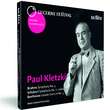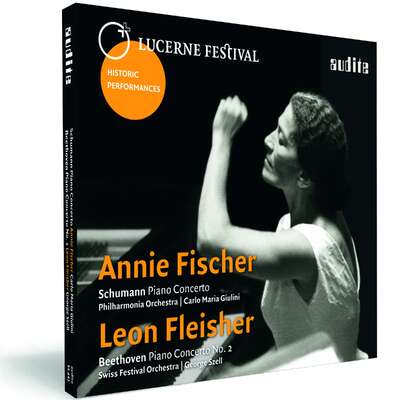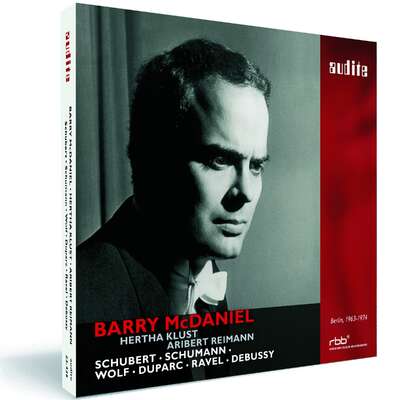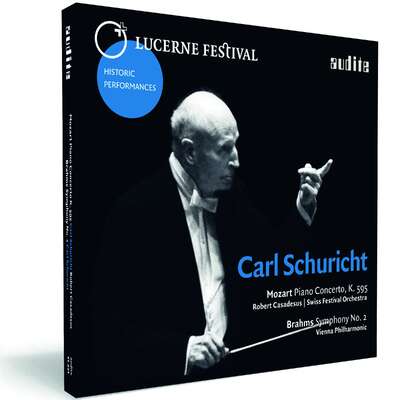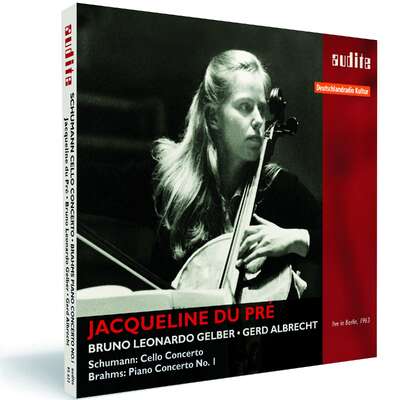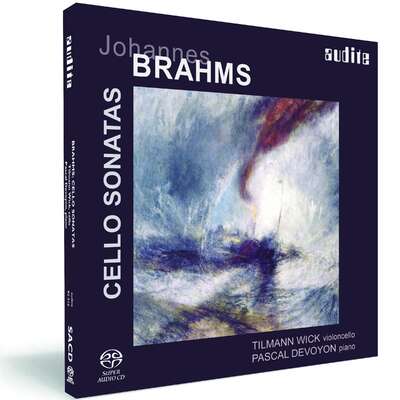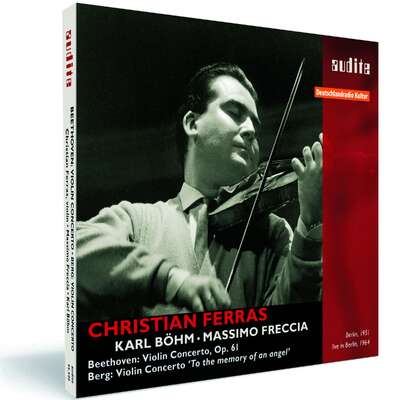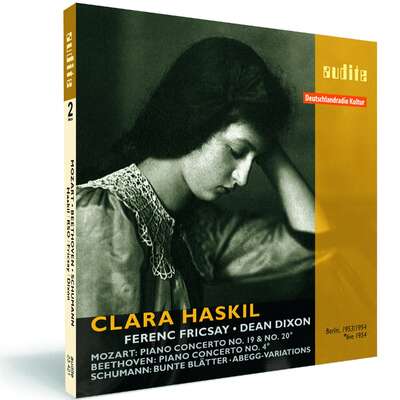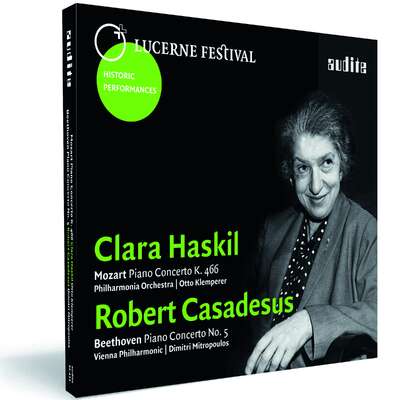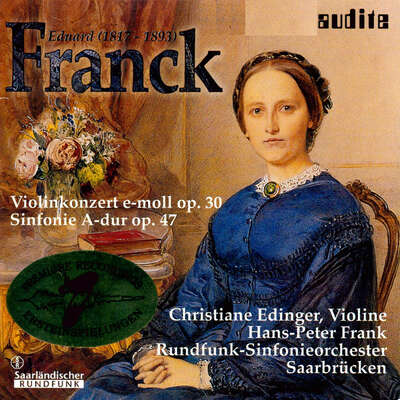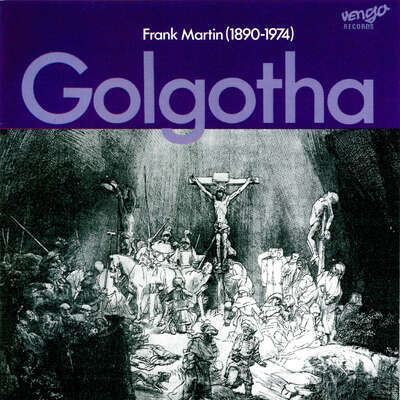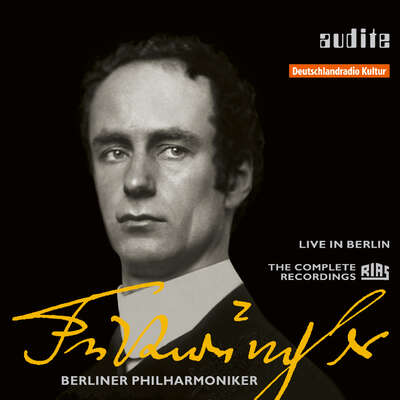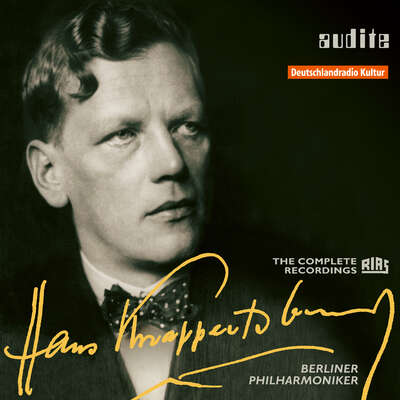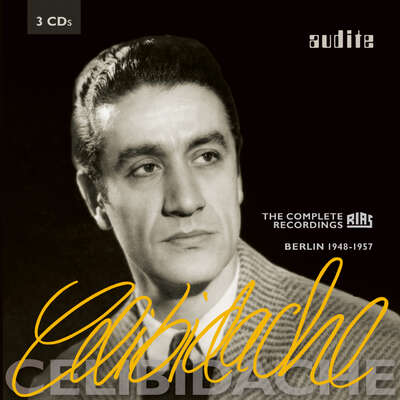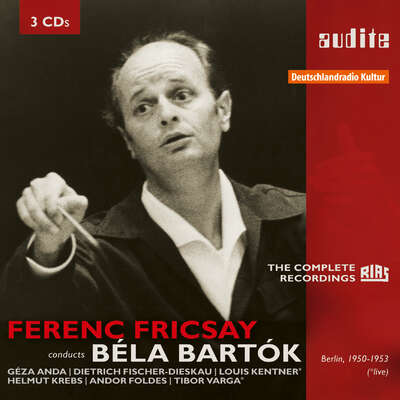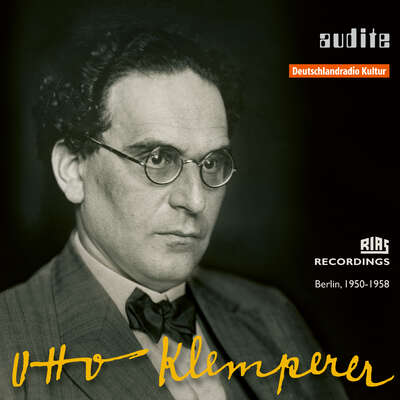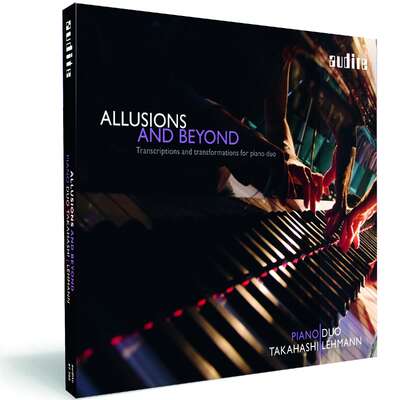
Auto-Rip
Wiederentdeckung eines Dirigenten, der heute als Geheimtipp unter Kennern gilt: Vor Faschismus und Stalinismus 1939 in die Schweiz geflohen, avancierte Paul Kletzki nach dem Zweiten Weltkrieg zu einem der führenden Pultstars. Der Luzerner Live-Mitschnitt zeigt Kletzki auf dem Höhepunkt seiner Kunst: spannungsreiche Interpretationen, expressiv und mit einem enormen Gespür für die musikalische Architektur.mehr
Wiederentdeckung eines Dirigenten, der heute als Geheimtipp unter Kennern gilt: Vor Faschismus und Stalinismus 1939 in die Schweiz geflohen, avancierte Paul Kletzki nach dem Zweiten Weltkrieg zu einem der führenden Pultstars. Der Luzerner Live-Mitschnitt zeigt Kletzki auf dem Höhepunkt seiner Kunst: spannungsreiche Interpretationen, expressiv und mit einem enormen Gespür für die musikalische Architektur.
Details
|
Paul Kletzki conducts Brahms, Schubert & Beethoven
LUCERNE FESTIVAL Historic Performances, Vol. 9 |
|
| Artikelnummer: | 95.642 |
|---|---|
| EAN-Code: | 4022143956422 |
| Preisgruppe: | BCB |
| Veröffentlichungsdatum: | 20. Mai 2016 |
| Spielzeit: | 76 min. |
Zusatzmaterial
Informationen
Es gilt einen Meister wiederzuentdecken: Zu Lebzeiten einer der führenden Pultstars, gilt Paul Kletzki, geboren am 21. März 1900 als Paweł Klecki im polnischen Łódź, heute als Geheimtipp unter Kennern. Die neunte CD der Reihe LUCERNE FESTIVAL Historic Performances präsentiert als Erstveröffentlichung einen Live-Mitschnitt aus dem Sommer 1946. Er zeigt Kletzki auf dem Höhepunkt seiner Kunst: Am Pult des Schweizerischen Festspielorchesters gelingen ihm spannungsreiche Deutungen von Brahms' Vierter Sinfonie, Schuberts Unvollendeter und Beethovens dritter Leonoren-Ouvertüre - expressiv und mit einem enormen Gespür für die musikalische Architektur.
Vor gleich drei totalitären Regimen - zunächst aus dem nationalsozialistischen Deutschland, wo er sich seit den 1920er Jahren als Komponist und Dirigent etabliert hatte und von Wilhelm Furtwängler gefördert wurde, später aus der stalinistischen Sowjetunion und schließlich aus dem faschistischen Italien - floh Paul Kletzki 1939 in die Schweiz. Hier wurde er zum Stammgast der Internationalen Musikfestwochen Luzern, des heutigen LUCERNE FESTIVAL, und startete seine Weltkarriere, die ihn zu allen bedeutenden Klangkörpern sowie als Chefdirigent u. a. nach Liverpool, Dallas, Bern und (als Nachfolger Ernest Ansermets) zum Orchestre de la Suisse Romande führte. Der vorliegende Live-Mitschnitt dokumentiert ein Wohltätigkeitskonzert, das Kletzki im Anschluss an Luzerner Schallplattenaufnahmen für die EMI dirigierte - die erste Produktion eines Schweizer Klangkörpers für den internationalen Schallplattenmarkt überhaupt. Die «Werke [...] erstanden in Wiedergaben, die mit der zur Brillanz gesteigerten Vollendung eine geistige Innenspannung und seelische Erfülltheit verbanden, wie man sie nur in ganz seltenen Fällen erleben kann», urteilte die Neue Zürcher Zeitung über Kletzkis Auftritt.
Der Live-Mitschnitt von 1946 gehört zu den ältesten Aufnahmen im audite-Katalog. Die Aufnahme wurde damals in Acetat-Platten von ca. 4 Minuten Spielzeit geschnitten, die dieser Veröffentlichung zu Grunde liegen. Trotz des hohen Alters der Aufnahmen und der besonderen technischen Herausforderung beim Remastering konnte Kletzkis beeindruckende Dynamik voll erhalten werden.
In Kooperation mit audite präsentiert LUCERNE FESTIVAL herausragende Konzertmitschnitte prägender Festspielkünstler. Ziel der Edition ist es, bislang weitgehend unveröffentlichte Schätze aus den ersten sechs Jahrzehnten des Festivals zu heben, dessen Geburtsstunde 1938 mit einem von Arturo Toscanini geleiteten «Concert de Gala» schlug. Die Tondokumente stammen aus den Archiven von SRF Schweizer Radio und Fernsehen, das die Luzerner Konzerte seit Anbeginn regelmäßig überträgt. Sie werden klanglich sorgfältig restauriert und durch Materialien und Fotos aus dem Archiv von LUCERNE FESTIVAL ergänzt: eine klingende Festspielgeschichte.
Besprechungen
http://hi-res.pw | April 28, 2018 | 28. April 2018 | Quelle: http://hi-res.pw...
Despite their old age and the particular technical challenges presented by the remastering process, Kletzki’s impressive dynamics have been fully preserved. Mehr lesen
Crescendo Magazine | 28 avril 2017 | Pierre Jean Tribot | 28. April 2017 | Quelle: http://www.cresc... Paul Kletzki à Lucerne
L’orchestre montre parfois certaines fragilités (vents !), mais la tension imposée par le chef galvanise les musiciens. En conclusion, on tient un concert d’un grand intérêt au service de la mémoire d’un chef trop oublié. Le travail de remasterisation des bandes d’origine est exceptionnel en dépit des limites techniques inhérentes à l’âge de la captation.Mehr lesen
Zuger Zeitung
| 05. Januar 2017 | Fritz Schaub | 5. Januar 2017 | Quelle: http://www.zuger...
Ein Flüchtling wurde zur Schlüsselfigur
CD-DOKUMENT – Die erste Schallplatte eines Schweizer Orchesters für den internationalen Markt entstand am Lucerne Festival. Paul Kletzki wurde damals zu einer Schlüsselfigur des Schweizerischen Festspielorchesters
Schuberts Unvollendete und Beethovens dritte «Leonore-Ouvertüre», dokumentieren nicht weniger eindrücklich, auf welch hohem Niveau damals das Festspielorchester stand, auch wenn die Tonqualität deutlich historisch ist.Mehr lesen
American Record Guide | November 2016 | David Radcliffe | 1. November 2016
This is a particularly interesting broadcast concert, recorded 7 September 1946 with an ad hoc orchestra which the Vienna-bound Walter Legge had justMehr lesen
This would be all for naught if the results were not musical, but I find these highly-charged performances persuasive, particularly the Brahms symphony. Subtle they are not, but if you enjoy unfiltered, late-romantic, expressionist modernism you will find it here, captured with a thrilling dynamic range not obtainable when this mode of performance was still in vogue. One thinks of over-the-top Russian 78s—it may be that the conductor, who had been in the Soviet Union before migrating to Switzerland, was inspired by Golovanov as well as by Furtwangler (who had once played his compositions in Berlin). It must have been a great release for Paul Kletzki to be able to travel in the West after all those difficult years, but this late outburst of Nikisch-Mahler sensibility is a worthy memorial of what he left behind. The production is first-rate.
Fanfare | October 2016 | James Miller | 1. Oktober 2016
Paul Kletzki was born in 1900 and died two weeks short of his 73rd birthday. A native of Poland, he moved to Germany in 1921 with the intention ofMehr lesen
I wonder if the concert featured the pieces in the order in which they appear on the CD; it seems to me that Beethoven and Schubert followed by Brahms would have been the likely order. These are certainly high-quality, intelligent performances with subtle tempo changes and an intelligent use of dynamics for dramatic emphasis. Interestingly, in the Passacaglia of the Brahms Fourth, he doesn’t even pretend to keep a steady tempo, letting each variation “speak for itself” with considerable success. As imposing as it may be, this performance is like a major step on the way to his superior (and two-channel) studio recording for EMI. The Schubert “Unfinished” is, if anything, even better, with the same flexible tempos and dynamic contrasts helping the music to tell its story. After these two achievements, the strong performance of the Leonore No. 3 is almost anti-climactic.
Speaking of the dynamic contrasts that Kletzki uses to such good effect, they are sabotaged to some extent by an unexpected intrusion—anything below mf is accompanied by the annoying swish of a stylus traversing the grooves of what I take to be a transcription disc. Are the performances actually from a “charity concert”? Could be, but the audience is astonishingly healthy and polite—there’s no shuffling, no coughing, and no applause whatsoever. As it happens, Kletzki made English Columbia 78s of all three works—the Beethoven and Schubert with the Philharmonia Orchestra and the Brahms with the Lucerne Festival Orchestra (!). In addition, I perceived what seemed to be a side break in the Brahms Symphony. All of these coincidences (?) may be explicable but I thought I should mention them. My speculations do not diminish my respect for the performances themselves, but they do have me wondering.
Audio Video Club of Atlanta | September 2016 | Phil Muse | 1. September 2016 | Quelle: https://s3.amazo...
The hand of the master is equally evident in Brahms’ Fourth, where he shapes the contours of the music to perfection, emphasizing both the architectural strength and the expressive beauty of this work. Mehr lesen
www.musicweb-international.com | Wednesday August 24th | Jonathan Woolf | 24. August 2016 | Quelle: http://www.music...
After the end of the Second World War, at a time when EMI’s Walter Legge was re-establishing continental European contacts, Paul Kletzki became aMehr lesen
His later Czech Philharmonic LP may be more familiar than the 78 but few Kletzki admirers would want to be without the ancillary pleasures of this live performance, notwithstanding its very close approximation to the 78 set. It’s a performance of architectural surety and expressive balance. Kletzki was not one for quirks or peculiarities and he invariably saw straight to the heart of things. Thus this reading is flexible but never rhythmically flabby, and whilst the string choirs don’t sing out, this may be as much to do with the rather constricted sound as anything else. The horns certainly sound on fine form – albeit there is a touch of distortion, especially noticeable in the second movement – and though the Lucerne winds can be a touch pinched tonally they are well balanced and generally personable-sounding. The Andante is nobly conceived, its narrative finely detailed, the scherzo propulsive. With a powerfully but musically convincing finale all that this really needs is slightly better engineering and a more open top, the better to capture the hall ambience. Otherwise, it reveals Kletzki, yet again, as a musician lacking grandiose pretentions but possessing the firmest architectural strengths.
Much the same goes for Schubert’s Unfinished Symphony which, whilst Kletzki jettisons the first movement repeat, is notably well-phrased and conceived in dramatic terms. There’s swish audible throughout but principally during the second movement where it becomes quite intrusive. I suspect that attempts to limit this have also taken some of the higher frequencies with it which accounts for the somewhat cramped sound. Nevertheless, the performance itself is deeply impressive, as is the intensity that Kletzki locates in the Leonore Overture No.3. There’s some chuffing here, too, and overload hints in forte outbursts.
These relatively minor distractions apart, Audite has done well to restore this concert. Documentation is first class.
Gramophone | August 2016 | Rob Cowan | 1. August 2016 Kletzki in Lucerne
An interesting Paul Kletzki release from Audite reproduces a 1946 concert performance of an interpretation that may be familiar to some readers as aMehr lesen
Stereoplay | 07|2016 | Attila Csampai | 1. Juli 2016 Brahms unter Strom
Es ist eine der spannendsten und zwingendsten Aufführungen der Vierten von Brahms, die ich je gehört habe, noch geballter und stringenter als die berühmten Referenzen von Klemperer und Toscanini. Vor allem in den beiden Ecksätzen kombiniert Kletzki strukturelle Dichte und emotionales Feuer zu gebündelten Energieschüben, die das späte Opus fast als Fanal jugendlicher Leidenschaft und so gar nicht als abgeklärtes Alterswerk erscheinen lassen.Mehr lesen
www.pizzicato.lu | 05/06/2016 | Remy Franck | 5. Juni 2016 Spontanes Dirigat von Paul Kletzki
Der Schweizer Dirigent Paul Kletzki (1900-1973), ehemaliger Chefdirigent in Liverpool, Dallas, Bern und beim ‘Orchestre de la Suisse Romande’,Mehr lesen
www.concertonet.com | 05/15/2016 | Simon Corley | 15. Mai 2016 Chefs oubliés: Paul Kletzki et Antonio Pedrotti
De récentes publications remettent à l’honneur deux chefs nés auMehr lesen
